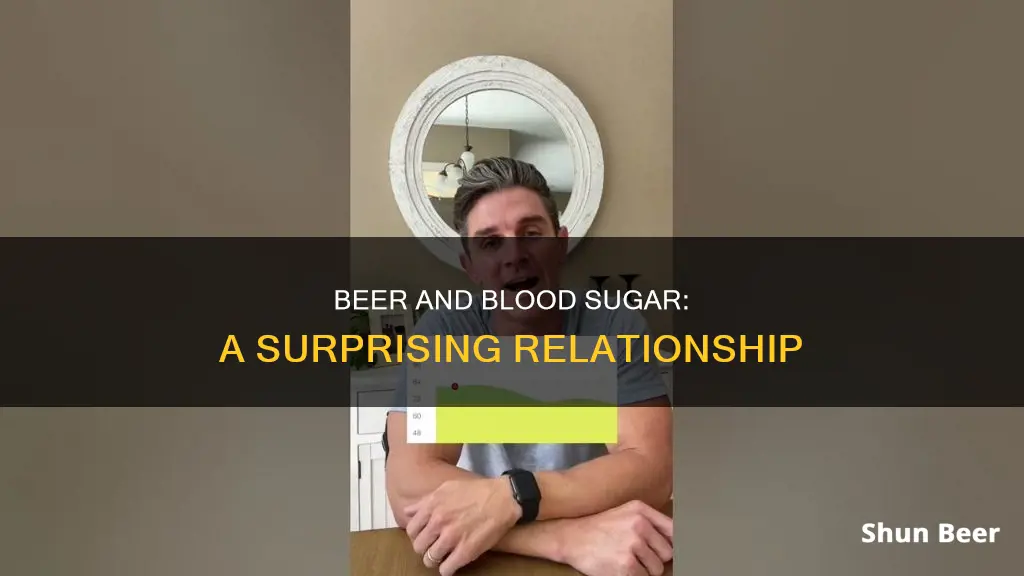
Alcohol can cause blood sugar levels to drop, which is known as hypoglycemia. This is because the liver, which releases glucose into the bloodstream to keep blood sugar levels normal, prioritises breaking down alcohol instead of releasing glucose when you drink. This can be dangerous, especially for people with diabetes, as it can lead to symptoms such as headaches, irregular heartbeat, anxiety, confusion, and even seizures. Therefore, it is recommended to drink in moderation, only after eating food, and to monitor blood sugar levels closely when consuming alcohol.
| Characteristics | Values |
|---|---|
| Effect on blood sugar | Beer can cause blood sugar to drop very low, leading to hypoglycemia. |
| Calories | Beer contains a lot of calories, which can lead to weight gain. |
| Carbohydrates | Beer is high in carbohydrates, which can raise blood sugar levels. |
| Alcohol content | Beer typically contains around 5% alcohol. |
| Serving size | A serving of beer is typically 12 ounces. |
| Safe consumption | It is recommended to drink in moderation, with no more than one serving per day for women and two servings per day for men. |
| Risks | Drinking beer can interfere with diabetes medications and worsen complications such as nerve and eye damage. |
| Recommendations | Drink with food, especially carbohydrate-rich snacks, to maintain normal blood sugar levels. Avoid drinking on an empty stomach or when blood glucose is low. |
What You'll Learn
- Beer and sweet wines are high in carbohydrates, which can raise blood sugar levels
- Alcohol can interfere with diabetes medication
- Alcohol can cause weight gain, which can make it harder to manage diabetes
- Alcohol can cause hypoglycemia, which can lead to seizures
- Alcohol can affect your body's ability to regulate blood sugar

Beer and sweet wines are high in carbohydrates, which can raise blood sugar levels
Alcoholic drinks can have a confusing effect on blood sugar levels. This is because the liver, which is responsible for stabilising glucose levels, has to work to metabolise the alcohol instead of releasing glucose. This can lead to hypoglycaemia, where blood sugar levels drop dangerously low.
Stouts, Porters and Guinness tend to be on the higher end of the beer carbohydrate spectrum and can have upwards of 20g of carbohydrates per pint. Regular lagers tend to vary from about 10-15g of carbs per pint, whereas some light beers have less than 10g of carbs per pint, and some have less than 5g.
If you have diabetes, it's important to keep your blood glucose levels stable. Alcohol can affect your body's ability to regulate blood sugar, especially if you haven't eaten enough. If you've consumed a lot of alcohol and had a big meal, it can also raise your blood sugar levels too high.
Beer and Blood Sugar: How Three Beers Affect You
You may want to see also

Alcohol can interfere with diabetes medication
If you have diabetes and are taking medication, it is important to talk to your doctor about how alcohol may impact your condition and medication. Drinking in moderation and with food can help reduce the risks associated with alcohol consumption for people with diabetes. However, it is crucial to understand how alcohol may affect your specific situation and what steps you need to take to prevent problems.
Beer and Sugar: What's the Connection?
You may want to see also

Alcohol can cause weight gain, which can make it harder to manage diabetes
In addition, when you drink alcohol, your liver prioritizes breaking it down instead of releasing glucose, which can lead to a drop in blood sugar levels. This can be especially dangerous for people with diabetes, as it can cause hypoglycemia and interfere with diabetes medications. The risk of low blood sugar remains for hours after drinking, and the more drinks consumed, the higher the risk. Therefore, it is recommended that people with diabetes drink in moderation and only when their blood sugar levels are well-managed.
Furthermore, weight gain caused by alcohol consumption can lead to increased abdominal fat, also known as a "beer belly." Abdominal fat is associated with several health complications, including an increased risk of diabetes, high blood pressure, and certain types of cancers. Thus, drinking alcohol can not only directly impact blood sugar levels but also indirectly affect diabetes management by contributing to weight gain and abdominal fat accumulation.
To manage weight and prevent weight gain while drinking alcohol, it is important to drink in moderation, limit mixed drinks with sugary additives, and opt for low-calorie options like light beer or distilled spirits. Additionally, it is crucial to eat a meal or snack containing carbohydrates before drinking and to avoid drinking on an empty stomach.
Beer and Blood Sugar: What's the Connection?
You may want to see also

Alcohol can cause hypoglycemia, which can lead to seizures
Hypoglycemia can have serious health consequences as the brain relies on adequate blood sugar levels to function properly. When blood sugar levels drop below 70 milligrams per deciliter (mg/dL), individuals may experience symptoms such as headaches, irregular heartbeat, anxiety, and confusion. In more severe cases, hypoglycemia can lead to seizures or convulsions. It is important to note that the symptoms of hypoglycemia can be similar to those of alcohol intoxication, making it difficult to distinguish between the two. Therefore, it is crucial to monitor blood sugar levels before, during, and after consuming alcohol.
To reduce the risk of alcohol-induced hypoglycemia, it is recommended to always consume alcohol with food, especially carbohydrate-rich snacks or meals. Drinking in moderation, ensuring proper nutrition, and consulting with a healthcare provider are also important measures to prevent hypoglycemia and its potentially dangerous consequences, including seizures.
Sugar's Effect on Beer Carbonation: Does it Fizz or Flop?
You may want to see also

Alcohol can affect your body's ability to regulate blood sugar
The risk of low blood sugar remains for hours after your last drink, and the more drinks you have, the higher your risk. This is why it's recommended that you only drink alcohol with food and always in moderation. It's also important to note that alcoholic drinks such as beer and sweetened mixed drinks are high in carbohydrates, which can raise blood sugar levels.
If you have diabetes, drinking alcohol can cause your blood sugar to drop very low, especially if you haven't eaten enough. On the other hand, if you've consumed a large amount of alcohol along with a big meal, it can raise your blood sugar levels too high. Alcohol can also interfere with diabetes medications, reducing their effectiveness.
Additionally, alcohol stimulates your appetite and may affect your judgment, leading to overeating and further disrupting your blood sugar control. Alcoholic drinks are often high in calories, making weight loss more difficult. It's crucial for people with diabetes to understand these risks and consult their doctor before consuming alcohol.
Beer and Sugar: The Sweet Truth About Beer
You may want to see also
Frequently asked questions
Yes, beer can cause blood sugar to drop. This is because the liver, which is responsible for releasing glucose into the bloodstream to maintain normal blood sugar levels, prioritises breaking down alcohol instead of releasing glucose when you drink. This can lead to a drop in blood sugar levels, especially if you are drinking on an empty stomach.
Drinking beer can lead to a serious drop in blood sugar levels, which is known as hypoglycemia. This can be dangerous, as it can cause symptoms such as headaches, irregular heartbeat, anxiety, confusion, and even seizures. Additionally, alcohol may interfere with diabetes medications and increase weight gain, making it harder to manage diabetes.
If you have diabetes and want to drink beer, it is important to drink in moderation and only when your diabetes and blood sugar levels are well-managed. Always drink beer with food, preferably a meal or snack that contains carbohydrates. Avoid drinking on an empty stomach, as this can increase the risk of low blood sugar. It is also a good idea to talk to your doctor about your drinking habits and get personalised advice.







